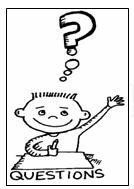题目内容
B. He; him
C. She; her
D. You; you

 One night, I wondered what it would be like if I only asked questions. I decided that no matter what anyone said to me the next day, I would reply only with 36 .
One night, I wondered what it would be like if I only asked questions. I decided that no matter what anyone said to me the next day, I would reply only with 36 . I loved to read about scientists and their discoveries, and I knew that scientists always started their research with a question. I hoped that I could become a scientist. Maybe by asking questions, I could train my mind to be 37 .
I survived the morning easily. “Is there any egg?” I answered when my mother asked what I wanted for breakfast. “Is this seat taken?” I asked when my friend Mike asked where he was going to 38 on the bus.
In the classroom, Mr. Black spoke slowly and clearly while I listened carefully. The problem had been part of my homework the night before. I wrote the answer on the board, “Could the answer be 361?”
Mr. Black smiled and nodded. I thought,“How did I 39 to get through that?” I almost laughed because asking questions really was starting to become a 40 .
I thought I had made it safely through the whole day, 41 what I had come to consider my experiment blew up at the dinner table when my dad asked me about my day. “What do I always do?” I replied.
My parents looked at each other. My father 42 again. “Well, I hope you went to school,” he said.
“Uhhh … why would you think otherwise?” I asked. My parents exchanged another 43
and were becoming annoyed.
“Do you think questions are a good way to train your mind to be active?” I asked.
“It 44 the question,” said my father. “Some questions are asked for 45 information. Those are good mind-training questions. Sometimes, people use questions to get the other person to say something. Sometimes people ask questions to get someone to agree with them. Those questions don’t really achieve anything.”
“I guess my experiment didn’t work,” I said, and I told my father about my 46 .
“I think it worked 47 !” my father said. “You made a discovery, didn’t you? What matters is that you have put your idea into practice.”
| 【小题1】 |
|
| 【小题2】 |
|
| 【小题3】 |
|
| 【小题4】 |
|
| 【小题5】 |
|
| 【小题6】 |
|
| 【小题7】 |
|
| 【小题8】 |
|
| 【小题10】 |
|
| 【小题11】 |
|
| 【小题12】 |
|
Everyone needs friends. Friends bring us happiness and hope in our lives. But the ability to make friends changes from person to person. To some people, making friends is easy, and to others it’s very difficult.
Making friends is a skill, and the first thing is to know how to get on with others.
If you have trouble in making friends, maybe I can tell you how to do it.
Realize your own good points. You have skills and talents(才能) that others will like.
Believe that you are a good person and have something nice to share with others.
Be humourous. Learn to laugh at yourself and your weakness. Remember to smile at others.
Respect(尊敬) the others. Everyone has his own idea. Learn how to listen to others’ ideas without trying to make them accept(接受) yours.
Be kind. If you are kind to others, they will usually be kind to you. There are hundreds of little things you can do to show your kindness. Open the door for someone. Wave to a friend and so on.
Don’t complain(抱怨). Learn to accept what you can’t change, and work hard to change what you can. No one is willing to hear your complaints all the time.
Never give up. Even if you are faced with some closed-minded people, never give up. And try to find someone who will understand you.
【小题1】Why do we need friends according to the passage?
| A.Friends can do everything for us. | B.Friends can bring us happiness. |
| C.Friends accept our ideas all the time. | D.Without friends, we could not live. |
| A.To help others. | B.To smile to others. |
| C.To get on with others. | D.To listen to others’ complaints. |
| A.Opening the door for someone. | B.Complaining to others all the time. |
| C.Laughing at ourselves and our weakness. | D.Finding someone who will understand us. |
| A.Five. | B.Seven. | C.Nine. | D.Eleven. |
 .
They are in yellow coats. They look the same. Jack, Linda, Lucy and Lily are
good friends. Jack, Lucy and Lily are in the same school. But Linda is not in the
school. They like China.
.
They are in yellow coats. They look the same. Jack, Linda, Lucy and Lily are
good friends. Jack, Lucy and Lily are in the same school. But Linda is not in the
school. They like China. B. To smile to others.
B. To smile to others.